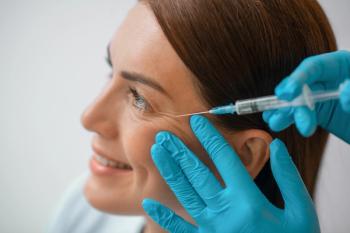
- Dermatology Times, September 2018 (Vol. 39, No. 9)
- Volume 39
- Issue 9
Is tight skin post shower a good thing?
In this month's Cosmetic Conundrums column, Dr. Draelos addresses “tight skin,” the use of menthol in skin care products and over-the-counter itch relieving products.
Is it healthy for skin to feel tight when you get out of the shower?
Many patients state that they do not feel clean unless their skin feels tight after exiting the shower. This tightness is not at all related to cleanliness, but rather to skin barrier damage and undesirable water evaporation. In reality, tight skin is damaged skin. I will explain the sequence of events.
Soap is an anionic surfactant with a high alkaline pH, which in turn causes swelling of the stratum corneum. This swelling allows unwanted deeper penetration of the soap into the skin possibly causing irritation and itching. Soap also binds to stratum corneum proteins further inducing swelling and hyper-hydration of the skin. Following the completion of bathing, the excess water evaporates leading to skin tightness. Thus, tightness is a sign of skin dryness because soap binding reduces the ability of the skin proteins to hold water. This explains why continued use of the alkaline cleanser on a daily basis in conjunction with hot water can lead to eczematous skin disease.
The tight skin feeling is reduced when lower pH cleansers are used, such as synthetic detergents, instead of soap. These synthetic detergents, known as syndets, are found in the cleansing bars known as “beauty bars.” These bars, which include Dove (Unilever), Cetaphil Bar (Galderma), and Olay Bar (Procter & Gamble), do not produce as much skin tightness and are noted by some to leave the skin feeling slimy. Some patients may associate the sliminess with residual cleanser residue or incomplete cleansing. This is not the case. The sliminess is the feeling of healthy clean skin.
Syndets do not cause as much protein denaturation as soaps due to the charge density of protein-bound micelle-like surfactant aggregates. Thus, anionic syndet surfactants, such as sodium lauryl sulfate and sodium laurate and sodium cocoyl isethionate, are less irritating than soap. It is sometimes difficult to convince male eczema patients that a dry tight feeling after showering is not good!
Why is menthol used is so many skin care products?
A whole area of skin care formulation is devoted to sensates. Sensates are substances that create a distinct feeling upon topical application. For example, male shaving preparations have long included menthol. It is unknown why the skin has menthol receptors, but the receptors are rapidly activated once menthol is applied topically. Most individuals will experience a cooling feeling with menthol, but a few will experience pain. Thus, there is variety in human response to sensates.
Many men experience stinging and burning from tiny razor nicks post shaving. Menthol creates a cooling sensation when applied topically in most individuals. A menthol-containing shave cream will replace the stinging/burning with cooling, which is a more satisfying post shave sensation. Menthol is also added to post-sunburn lotions to replace the burning sensation with a cooling sensation. Therapeutic anti-itch moisturizers will also contain menthol to replace the annoying itch with cooling.
Menthol is also used in variety of formulations where noxious sensory stimuli are not present, such as acne preparations. Some OTC acne products contain menthol to create a tingling feeling post-application. The tingling feeling is used to appeal to young consumers who equate the tingle with product efficacy. Indeed, young people find a menthol-containing acne cream more effective than the same formulation without the menthol. Sensates play a large role in product perception and sales.
How are over-the-counter itch relieving products evaluated?
It is sometimes challenging to develop itch products and assess multiple formulations for efficacy, since itch is a transient symptom varying in perception from person to person. One of the newer ways to standard itch is to expose the skin to cowhage, an irritating plant. Most people will itch when their skin contacts cowhage. Once the itch is induced, the itch relieving products can be applied to determine which one is most effective. While itch due to dermatologic disease differs from irritant induced itch, cowhage exposure can be used as a screening tool for the cosmetic chemist.
Articles in this issue
over 7 years ago
Spironolactone as effective as antibioticsover 7 years ago
Psychological stress as acne causeover 7 years ago
Technology: A private practice’s best friendover 7 years ago
Lack of standardization?over 7 years ago
Update: Immunotherapy for melanomaover 7 years ago
A new treatment for seborrheic keratosis examinedover 7 years ago
Hidradenitis suppurativa and Crohn’s disease linkover 7 years ago
Clinical trials recruiting: Molluscum contagiousumover 7 years ago
Psoriasis lotion seeks FDA approvalNewsletter
Like what you’re reading? Subscribe to Dermatology Times for weekly updates on therapies, innovations, and real-world practice tips.











